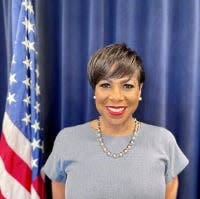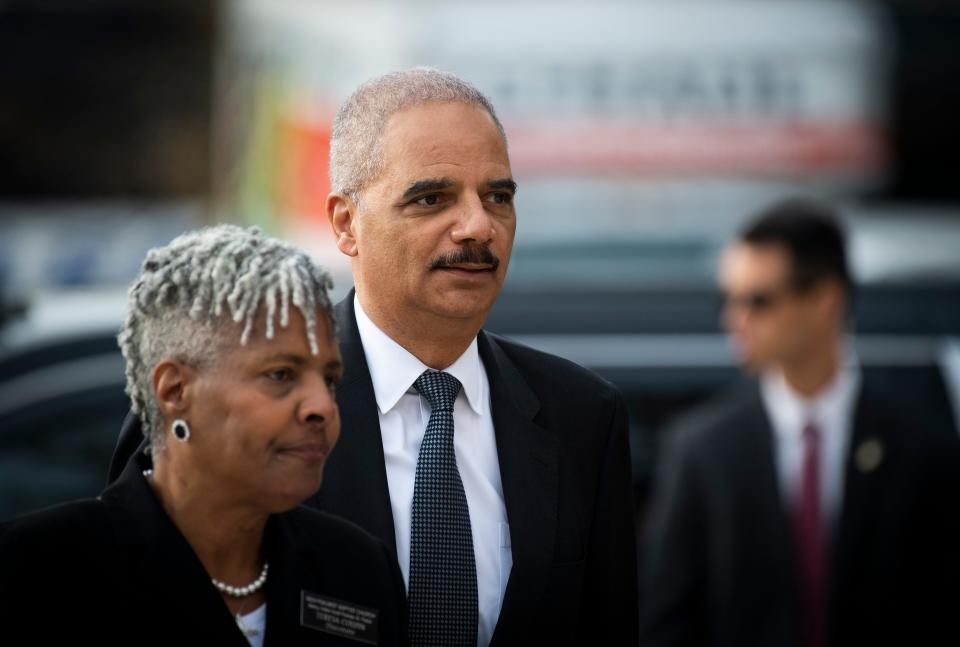A dramatic shift is happening: Biden is tapping more and more Black prosecutors for US attorney posts
- Oops!Something went wrong.Please try again later.
- Oops!Something went wrong.Please try again later.
WASHINGTON – For a long time, Dawn Ison was hesitant to talk about the deep personal loss that shadowed her early life in Detroit.
Her first-grade teacher relayed the tragic news that her 5-year-old cousin had been run down by a drunk driver. The skid marks left in the street are seared into her memory still. At 9, her father was murdered, a devastating consequence she attributes to an "unhealthy" lifestyle.
Ison is recalling those painful moments more frequently now because as the newly-confirmed U.S. attorney and chief federal prosecutor for her beloved hometown – the first Black woman to hold the office – her life experience resonates in a community long-scarred by similar losses.
“I’ve been both a defense attorney and a prosecutor, but it’s this lived experience that brings value to this job,” Ison said.
The Georgia DA investigating Trump: Remember Trump’s call to ‘find’ votes in Georgia? Meet Fani Willis, the DA who could charge him
While the historic nomination of the first Black woman to the Supreme Court has drawn much of the national spotlight, the Biden administration has been quietly moving to install one of the most diverse classes of U.S. attorneys in recent history.
Of the 43 chief federal prosecutors nominated so far to lead the 93 federal districts, 48% are Black, including 16 people of color who represent firsts for their districts, according to the Justice Department.
The numbers represent a dramatic pivot from the Trump administration. A 2020 analysis by the Associated Press found that 85% of Trump’s Senate-confirmed U.S. attorneys were white men.
Although early in the process, the transformation is already taking shape from Seattle to Manhattan, where Nicholas Brown and Damian Williams were recently installed as the first Black prosecutors to lead their respective districts.

Historic nominations: For Black women judges like Jackson, blazing a trail has meant opportunity, scrutiny
The nominations also come at a consequential time as the social justice movement has exposed a broad lack of public confidence in law enforcement. Crime has been surging in major cities where some of the violence has targeted people of color; and as the Justice Department has reinvigorated its scrutiny of local police department operations and stepped up voting rights protections.
Ben Crump, a civil rights attorney whose clients have become the faces of the racial justice movement, calls the nominations a "landmark" for the federal criminal justice system.

"You now have prosecutors who have life experiences like the people who they are deciding whether to prosecute," Crump said. "More diverse U.S. attorneys mean more equitable justice."
10 years later: How Trayvon Martin’s killing galvanized a new era of social activism
Attorney General Merrick Garland said the group is at the "forefront" of the Justice Department mission.
"This class of U.S. Attorneys will bring the rich set of perspectives, experiences, and knowledge necessary for the Justice Department to fulfill our most important responsibilities," Garland said in a statement to USA TODAY.
'Changing the culture' is 'a necessary step'
In a first-year assessment of the Biden administration's campaign to revamp the criminal justice system, analysts at the Brennan Center for Justice described the overall promise as "unfulfilled" – with some exceptions.
The report credited the administration's efforts so far to diversify the federal judiciary –highlighted by the recent nomination of Judge Ketanji Brown Jackson to the Supreme Court – and its efforts to transform the ranks of federal prosecutors.
Yet, the overhaul also has run into opposition.
Late last year, Rachael Rollins was narrowly confirmed as Massachusetts' chief federal prosecutor, the first Black woman to hold that post, in the face of vocal resistance by Senate Republicans. They seized on Rollins' stand as a local district attorney not to prosecute some non-violent misdemeanor offenses to focus on more serious crime.
Iowa Sen. Chuck Grassley, the Senate Judiciary Committee's ranking Republican, described Rollins as "lenient." Sens. Tom Cotton, R-Ark., and Ted Cruz, R-Texas, meanwhile, cast Rollins as a "radical" appointment during a contentious confirmation process in which Vice President Kamala Harris ultimately cast the deciding vote of the full Senate.
Ketanji Brown Jackson: Judge Ketanji Brown Jackson would add another Protestant voice to heavily Catholic Supreme Court

The Brennan Center's report, however, noted that Rollins' early crime-fighting policies had produced "positive results for the community."
Cotton also has been leading an effort that has stalled a slate of U.S. attorney hopefuls, including Marisa Darden, who would be the first Black woman to lead Ohio's northern district in Cleveland.
Still, Lauren-Brooke Eisen, director of Brennan's Justice Program and one of the authors of the report, described the Biden prosecutor appointments overall as particularly striking.
"These nominations don't get a lot of attention, compared to the judiciary," Eisen said. "But it is pretty significant that so many have come from diverse backgrounds."
Beyond their roles as chief federal prosecutors in their districts, the U.S. attorney ranks are also important because they provide a pipeline of candidates for key executive posts across the government, Eisen said.
Eric Holder, a former U.S. attorney in the District of Columbia, was confirmed as the first African American to serve as attorney general. Holder was succeeded by Loretta Lynch, a former U.S. attorney in Brooklyn, as the first Black woman to hold the office.

"For decades, there has been a narrow understanding for how you end up in these elite roles," Eisen said.
Before and after Biden's election, civil rights and criminal justice advocates have singled out the network of federal prosecutors as necessary partners in a true reimagination of a criminal justice system that has long wielded the hammer of harsh punishment.
Last year, a coalition of advocacy groups directly called on Biden to elevate "committed reformers to these powerful roles, not the same tough-on-crime prosecutors and corporate law attorneys who helped to construct our current broken order."
"Changing the culture of U.S Attorney offices will be a necessary step on this road toward equity and justice," the groups said in a March letter to Biden.
Not just the Supreme Court:: Biden poised to triple number of Black women on federal appeals courts
'A problem in the entire legal profession'
During a time of surging violent crime and the troubling rise of the domestic extremist movement, federal prosecutors across the country are confronting an often daunting mission.
Yet some of the newest members of this exclusive group believe that a commitment to diversity deserves equal rank and should apply beyond their own executive suites.
In Indiana, where Zachary Myers and Clifford Johnson were recently confirmed as the first African American U.S. attorneys in their state's respective districts, Myers said his appointment has underscored a striking need for the office to reflect the face of the community he serves.
"I think that you can probably count on two hands, maybe a little more, the number of Black, the number of Hispanic attorneys who have come through this office since it was established" in 1928, said Myers, whose district is based in Indianapolis.

Of the 42 assistant U.S. attorneys who serve 4.2 million people in the greater Indianapolis area, two are Black and three are Asian Americans and Pacific Islanders, according to data at the time Myers took office late last year.
Ketanji Brown Jackson: Jackson says she's 'humbled' by historic nomination to Supreme Court as focus shifts to Senate
"This isn't just a problem in this office, it's a problem in the entire legal profession," said Myers, a former federal prosecutor in Maryland. "If we're not bringing in diverse folks, in addition to lacking those perspectives to make the best decisions and to do the best work and to build that community trust and legitimacy, we're also missing out on a huge percentage of the talent out there.
"I think that there's nowhere in the law that these diversity issues are more important than prosecutors because of the powers we have," Myers said.

In Charlotte, North Carolina, where Dena King is the first person of color to serve as U.S. attorney in that office, she said the composition of the staff is key to delivering "equal justice."
Since taking office in late November, King said she has re-established a panel aimed at recruiting a more diverse office that covers 32 counties in the state, including Cherokee tribal lands.
Of the 74 Justice staffers in the office, 19 are people of color.
King, raised in the Charlotte area and a graduate of North Carolina State and North Carolina Central University School of Law, said the inclusion effort brings needed "credibility" to a system that is often mistrusted by people of color.
"I hope I am the first of many," she said.

Recent nominations represent a sea change
For Ison, the job also is personal.
Like King, Ison grew up in the community she now serves and where she shares deep roots in local law enforcement. A federal prosecutor for two decades, she was chief of the office's Drug Task Force Unit. Her husband is a retired cop.
The greater Detroit area, the heart of her district, is a rich mix of Black, Hispanic and Arab American communities.
Of the 119 assistant U.S. attorneys, 97 are white. Ten are black, 10 are Asian American, one is Hispanic and another is American Indian/Alaskan.
Reconnecting neighborhoods: What's the price of community? Infrastructure law devotes $1 billion to reconnect neighborhoods split by interstates
"In a place like this, in a district like this, our office should better reflect the community we serve," Ison said. "And I think we have failed in that regard. I think we have failed for years in that regard. I am only the third Black U.S. attorney in the district to serve in this role. Only two Black men served in it before me. And that's pretty galling, appalling, too.
"In a community like this, it's just astounding that we have not had more representation, more diverse representation," she said.
From her Detroit base, the most recent nominations and confirmations mark a sea change of sorts from the prior administration.

Of about 50 assistant U.S. attorneys hired for the office during the previous administration, only a handful were Black, Asian or Middle Eastern.
"That means something," she said, referring to a recent trip in her district where a tribal council member took notice of her appointment.
Ison said she described her modest upbringing, along with the personal loss, not unlike the "generational trauma" in tribal territory.
"At one point, the council member said, 'I think it's good to have a minority in this role.'"
This article originally appeared on USA TODAY: Black prosecutors make up 48% of President Biden's US attorney picks

